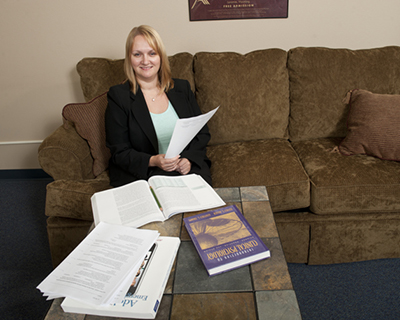Clinical Training
 The clinical program adheres to the "scientist-practitioner" model. Research knowledge
and experience are viewed as fundamental parts of student's education and critical
to the role of a clinical psychologist. The fundamental principles of research (such
as hypothesis formation and testing) guide the process of psychotherapy.
The clinical program adheres to the "scientist-practitioner" model. Research knowledge
and experience are viewed as fundamental parts of student's education and critical
to the role of a clinical psychologist. The fundamental principles of research (such
as hypothesis formation and testing) guide the process of psychotherapy.
In-House Clinical Training
Assessment5400 - Clinical Assessment I
5410 - Clinical Assessment II
5425 - Diagnostic Interviewing
The assessment sequence provides coursework and practical experience in intellectual,
academic achievement, personality assessment, and structured diagnostic interviewing.
A grounding is provided in the standardization, administration, scoring, interpretation,
and communication of the results of psychological evaluation both in writing and in
consultation with referral sources. Under close supervision, students learn to integrate
information, write comprehensive psychological reports, and provide feedback to clients.
Direct observation and video recording reviews facilitate the acquisition of basic
assessment skills. Volunteers, Psychology Center clients, and community referrals
serve as the basis for clinical experiences.
The Psychology Center
307 Biological Sciences
5330 - Intro to Clinical Practicum
5340 - Intro to Clinical Supervision
5450 - Departmental Clinical Practica
The Psychology Center provides a traning facility for graduate students to conduct assessments, psychotherapy,
and group therapy for UW students and the Laramie community. Facilities include a
reception area, individual and group therapy rooms, a conference room, and a work
room for graduate students to conduct clinical work. Capabilities exist for direct
observation and digital recording of sessions.
Clinical training begins during the first year by observing psychotherapy with advanced
students and participating in weekly supervision meetings. In the second year, students
provide psychotherapy and assessments to clients under the supervision of clinical
faculty. They also attend a weekly 2-hour case presentation with the other clinical
students and faculty supervisors. Group supervision provides exposure to different
approaches to case formulation and treatment. The third year practicum includes a
focus on implementing empirically supported treatments and therapy with a broader
range of clients.
Off Campus Clinical Training
Students work full-time (40 hours/wk for 10 weeks) in a variety of settings, during their second and/or third summers in the program.
Two basic goals are common to all placements. These are to:
- develop clinical skills through supervision by professionals outside the University;
- allow the student opportunity to gain knowledge of the programs, administration, clients, and problems of an agency similar to one in which he or she may eventually work or to which consultation services may be provided.
Settings may include outpatient mental health centers, inpatient hospitals, VA medical centers, residential programs, and private practice settings.
Clients served include children, adolescents, adults, elderly adults, and incarcerated individuals.
Experiences in these settings can include assessment; individual, group and family psychotherapy; intake evaluations; case management; and skills training.
Locations of placements cover a wide geographical region, primarily in Wyoming, but also in neighboring states such as Colorado, South Dakota, and Nebraska. Relocation is usually necessary each summer.
The summer clerkships are regarded as an integral part of the student's training. Coordination between agencies and the program is maintained by a faculty member charged with this responsibility. Prior to placement, this faculty member discusses with the placement agencies and students the goals and experiences desired. In the summer, he or she travels to these agencies to consult with agency supervisors and students regarding the student's activities and progress.
Summer clerkships are funded by the host agencies and salaries vary. Tuition for each clerkship is the fee for 3 credit hours. This cost is borne by the student and is not covered by assistantship waivers.
Although summer clerkships are typical, distributed clerkships can sometimes be arranged so that that student completes 400 hours of clinical experiences during the academic year.
More information can be found in the Clerkship Handbook

